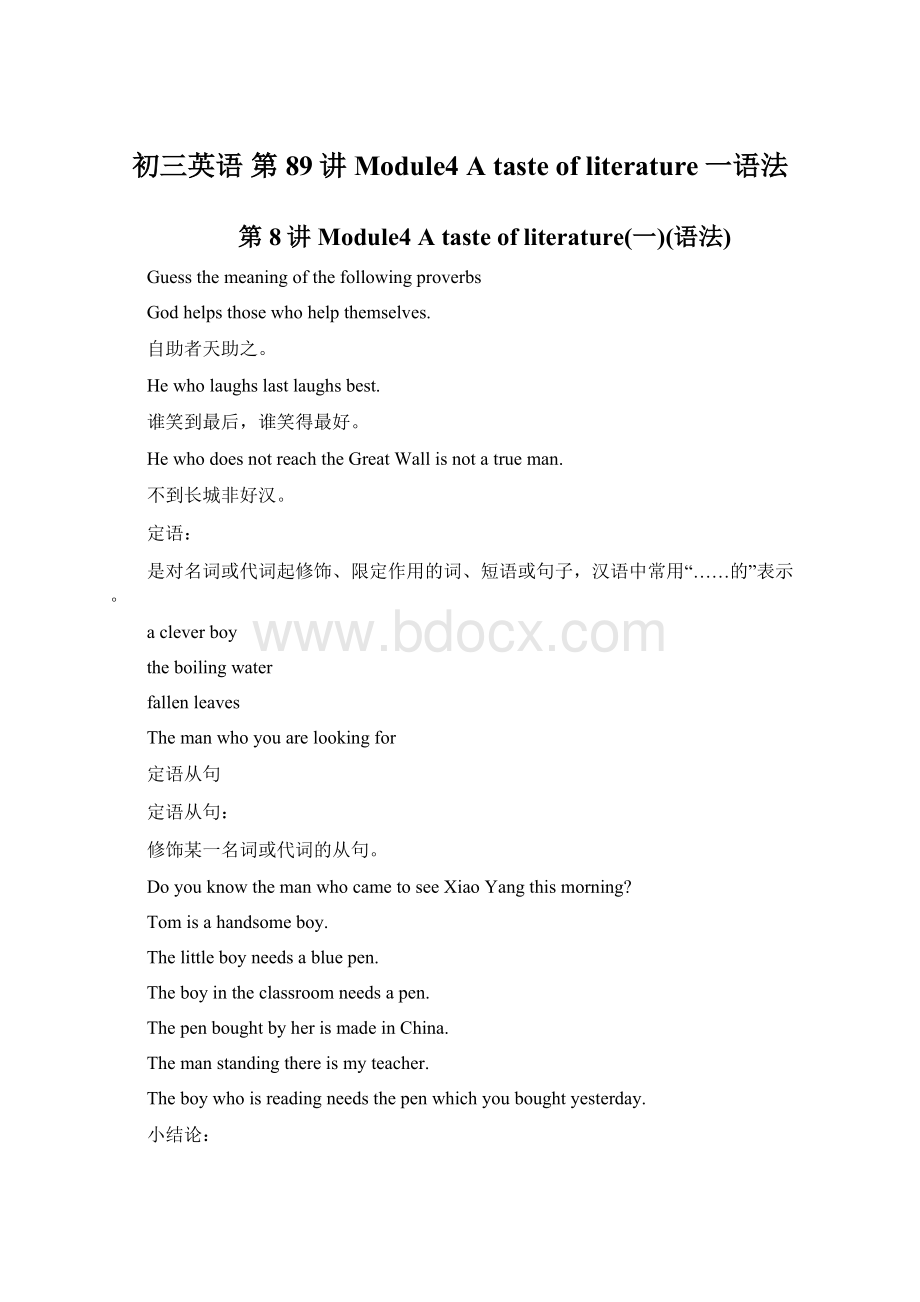初三英语 第89讲 Module4 A taste of literature一语法.docx
《初三英语 第89讲 Module4 A taste of literature一语法.docx》由会员分享,可在线阅读,更多相关《初三英语 第89讲 Module4 A taste of literature一语法.docx(13页珍藏版)》请在冰豆网上搜索。

初三英语第89讲Module4Atasteofliterature一语法
第8讲Module4Atasteofliterature
(一)(语法)
Guessthemeaningofthefollowingproverbs
Godhelpsthosewhohelpthemselves.
自助者天助之。
Hewholaughslastlaughsbest.
谁笑到最后,谁笑得最好。
HewhodoesnotreachtheGreatWallisnotatrueman.
不到长城非好汉。
定语:
是对名词或代词起修饰、限定作用的词、短语或句子,汉语中常用“……的”表示。
acleverboy
theboilingwater
fallenleaves
Themanwhoyouarelookingfor
定语从句
定语从句:
修饰某一名词或代词的从句。
DoyouknowthemanwhocametoseeXiaoYangthismorning?
Tomisahandsomeboy.
Thelittleboyneedsabluepen.
Theboyintheclassroomneedsapen.
ThepenboughtbyherismadeinChina.
Themanstandingthereismyteacher.
Theboywhoisreadingneedsthepenwhichyouboughtyesterday.
小结论:
单词或单个的分词作定语时通常放在它所修饰的词之前,作前置定语。
分词短语,介短和从句作定语时则放在所修饰的词之后,作后置定语。
先行词:
被修饰的名词或代词。
关系词:
引导定语从句的关联词称为关系词,关系词有关系代词和关系副词。
关系代词:
that,which,who,whom,whose,as
关系副词:
where,when,why
重要推论:
关系词的3个作用
1·引导定语从句。
2·代替先行词。
3·在定语从句中担当一个成分。
题一:
Matchthetwosentences
1.I’mreadingabook.ThebookisaboutBillGates.
_______________________________________
2.Heisateacher.TheteacherteachesusChinese.
_______________________________________
3.Idon’tliketheman.Heissmoking.
____________________________________
4.Whereisthepicture?
Youboughtitlastweek.
____________________________________
HeisaChinese.
HeplaysanimportantpartinNBA.
变为定语从句
HewasborninShanghai.
Shanghaiisaninternationalcity.
警示:
关系代词在从句中作主语时,从句的谓语动词的人称和数必须与先行词保持一致。
Thosewhoareagainsttheplanputupyourhands.
Themanwhoisnexttoussellsvegetable.
※典型考点
题二:
Tomisoneofthestudentswhopraisedbytheteacheryesterday.
Tomistheonlyoneofthestudentswhopraisedbytheteacheryesterday.
Heisagoodman.
Peopleareproudofhim.
变为定语从句
Helovesbasketball.
Heplaysbasketballverywell.
变为定语从句
Heisafamousbasketballplayer.
HiswifeisYeLi.
关系代词that,which引导的定语从句:
如果先行词是表示物的名词或代词,关系代词应用that、which.(作主语或宾语)
which/that作主语.(不能省)
Thisisadream.
Thedreamwillnevercometrue.
Thisisadreamwhich/thatwillnevercometrue.
Thedoghasbeenfound.
Thedogwaslost.
Thedogwhichwaslosthasbeenfound.
(作主语)
which/that作宾语:
(可省略)
Thisisthecard.
I’vejustreceivedthecard.
Thisisthecard(which/that)I’vejustreceived.作宾语
关系代词who,that,whom引导的定语从句:
如果先行词是表示人的名词或代词,关系代词应用
who,that(作主语或宾语)
whom(作宾语)
who/that作主语.(不能省)
Thisisthefilmstar.
ThefilmstarisverypopularinChina.
Thisisthefilmstarwho/thatisverypopularinChina.(作主语)
who/whom/that作宾语:
(可省略)
Themanisafamouswriter.
Hedescribedthemanjustnow.
Theman(who/whom/that)hedescribedjust
nowisafamouswriter.(作宾语)
小结:
that-既可指人,也可指物,作主语,不能省略;作宾语,可以省略。
which-指物,作主语,不能省略;作宾语,可以省略.
who-指人,作主语,不能省略;作宾语,可以省略,(常用whom)
注:
当关系代词在定语从句中作主语时,定语从句的谓语动词形式由先行词决定。
whose作定语,表示所属关系。
Theboyismyclassmate.
Theboy’sfatherisapoliceman.
Theboywhosefatherisapolicemanismyclassmate.
Theboywhoisreadingneedsthepen.
whose引导的定语从句注意点
whose引导定语从句,其后应紧跟名词,构成名词短语。
whose与它所修饰的名词一起可以作介词的宾语。
Thebossinwhosedepartmentheworkedhadheardthenews.
whose引导的定语从句,其先行词既可以指人也可以指物。
whose的先行词指物时,可用ofwhich代替,但语序不同,即whose+名词=the+名词+ofwhich,或=ofwhich+the+名词。
Thenovelwhosetitle(=thetitleofwhich或ofwhichthetitle)isRedandBlackisveryinteresting.
whose的先行词指人时,可用ofwhom代替,但语序不同,即whose+名词=the+名词+ofwhom,或=ofwhom+the+名词。
Theboywhosemother(=themotherofwhom或ofwhomthemother)isadoctorismyfriend.
题三:
Theboy____________isplayingping-pongismyclassmate.
题四:
Thee-mail___________Ireceivedyesterdaywasfrommysister.
题五:
Theman______hairiswhiteishisgrandfather.
题六:
我不认识那个和你说话的女孩。
题七:
她是一个叫玛丽的女孩。
题八:
那些正在打网球的男孩是我的朋友。
第9讲Module4Atasteofliterature
(二)(语法)
表示方位、场所的介词
in,on,to
in表示在某一地区之内的某方位(属于该范围);
on表示与某地是毗邻关系;
to表示在某一地区之外的某方位(不属于该范围)。
题一:
Harbinis______northernChina.
哈尔滨在中国北部。
NorthKoreais______theeastofChina.
朝鲜位于中国东部。
Japanis_____theeastofChina.
日本位于中国东部。
/日本位于中国东面。
三组表示位置关系的介词比较
in+大地方
at+小地方
on+门牌,某层楼
题二:
Myunclelive___F12__thefifthfloor.
A.at,onB.in,onC.on,at
Theyarrived___Beijingat12:
00andwaitedforabus___thestationtothehotel.
A.at,inB.in,onC.in,at
题三:
Weare__TeamOne.Isit__thefrontoftheclassroom.LiPingis___myleft.
A.on,in,atB.in,in,atC.in,at,on
Ihaveagoodseat.Isit__thebus.
A.inthefrontofB.infrontof
over,above,on
over指“在…的正上方”,表示垂直在上。
above指“在…上方”。
on指“在上面”,表示两物体接触。
题四:
Thereisabridge_______theriver.
这条河上有一座桥。
Raiseyourarms_______yourhead.
把你的手臂举过头。
Thenotebookis______thebed.
笔记本在床上。
below和under
below表示“在下方或位置低于…”,不一定有“垂直在下”之意;
under表示“在…正下方”。
Thedogisunderthetable.小狗在桌子底下。
Therearealotoffishesbelowthesurfaceofthewater.
水面下有各式各样的鱼。
near
near表示“在附近的,不远的”,是far的反义词。
nextto指紧挨着。
Isthereabusstopnearhere?
这附近有公共汽车站吗?
by
by指“在…旁边”,距离比near要近,有时也可用beside。
Theboyisstandingbythewindow.
这个男孩站在窗户旁边。
between
between表示“在两者之间”,常与and连用;
SheissittingbetweenKateandRose.
她坐在凯特和罗斯之间。
around
表示“环绕,在…周围,在…四周”;
Theywalkedaroundthestreet.
他们在街上到处走。
among
指在三者或更多的之中,其宾语通常是复数名词或复数代词。
Thereisabeautifulhouseamongthetrees.
林子里有一栋漂亮的房子。
before,behind
before表示位置关系时与infrontof通用,表示“在…前面”;
behind表示“在…后面”;
Thereisatreeinfrontofthehouse.
Thereisatreebehindthehouse.
behind=atthebackof
infrontof/inthefrontof
infrontof表示“在…范围外的前面”;
inthefrontof表示“在…范围内的前面”。
Ourteacherusuallystandsinthefrontoftheclassroom.
Hesitsbefore/infrontofme.
along
表示“沿着”
walkalongtheriver沿着河边散步
ridealongtheroad沿着马路骑车
across
表示“横过”;
swimacrosstheriver横渡过河
walkacrossthestreet过马路
through
表示“贯穿,通过”,从内部穿过。
walkthroughtheforest穿过森林
flowthroughthecity流过城市
in
表“在…之内”,用于静止的位置;
Thestudentsareintheclassroom.
学生们在教室。
into
表“进入”,用于表示有特定终点的运动的方向,常用于go,walk,come,run,jump等动词之后;
Thestudentsarerunningintotheclassroom.
学生们正跑进教室。
outof
表示“从…里面出来”,也有一定的运动方向。
Herushedoutoftheroom.
to
表示“到达…地点(目的地)或方向”;
HecametoJapanin1999.
他1999年来到日本。
for
表示目的地时,一般和固定词搭配,leavefor(动身去),startfor(出发去);
I’llleaveforAmericanextweek.
下周我将动身去美国。
from
注重起点,表示从…起;
It’sabouttenminutes’walkfromheretothecinema.
从这儿到电影院大约需要十分钟。
题五:
Therearesomestamps____thedesk.(on,over,above)
题六:
Afterweswam______theriver,wewalked_______aforest.(across,along,through)
题七:
Weplantedsometrees_______________thehouse.(infrontof,inthefrontof)
题八:
Wearesitting_______theteacher,playinggames.(between,among,around)
题九:
Sallyisveryhappy.Thereisabigsmile____herface.(on,in,to)
表示方式、手段和材料或工具的介词
with
表示“和…在一起”
Willyoupleasegowithme?
表示“具有,带有”
Hewasahandsomeboywithlargebrighteyes.
用某种具体有形的工具
Hewrotetheletterwithanewpen.
without
表示没有,是with的反义词。
Mencan’tlivewithoutairandwater.
没有空气和水人类无法生存。
Pleasegivemeacupofcoffeewithoutmilk.
请给我一杯不加奶的咖啡。
in
用什么材料,例如墨水,铅笔等;
Shewrotealetterinblackink.
用某种语言;
What’sthatinEnglish,Mary?
表示衣着或某种声调特点。
Thegirlinredismysister.
Shealwaysanswersmyquestionsinasoftvoice.
by
表示用某种方式或手段,在名词前不加冠词,若后接动词,须将动词变为动名词形式。
Hegoestoschoolbybicycle.
他骑自行车上学。
Hemakesalivingbyteaching.
他靠教书谋生。
Thehatismadebyhand.
这顶帽子是手工做的。
Tips:
bybus=ona/thebus
bycar=ina/one’scar
表示“排除”或“包括”的介词
except
表示“把…排除之外”,与“but”通用。
Everyoneishereexcept/butTom.
除了Tom大家都来了。
Ilookedeverywhereexcept/butbathroom.
除了浴室我哪都找了。
besides
用于肯定句时,表示“除了…还有…”。
Shealsolikespurplebesidespink.
除了粉色她还喜欢紫色。
including
强调同类事物中包含具有另外特征的一部分。
Thereare20passengersonthebus,includingfivekids.
车上有20名乘客,包括5个孩子。
表示“关于”的介词
about
表示“关于,有关”,强调内容;
PleasetellmesomethingaboutyourEnglishstudy.
请告诉我一些有关你英语学习的情况。
on表示“关于,论及”,多用于演说和学术论文上。
Hewroteabookoneducation.
他写了一本有关教育的书。
bemade/used之后
介词的选择
1)bemadein在某地生产制造;
ThecarwasmadeinChina.这辆车是中国制造的。
2)bemadeof和bemadefrom都可以表示“由…制成”,但bemadeof强调从成品中能看出原材料,而bemadefrom则表示从成品上看不出原材料;
Thehouseismadeofstone.这房子是石头造的。
Cheeseismadefrommilk.奶酪是牛奶做的。
3)bemadeinto表示“被制成…”,什么东西被制成什么东西。
Milkismadeintoyogurt.牛奶可做成酸奶。
beused常见结构
beusedto表“习惯于(做)…”,后接名词、代词或动名词形式。
Heisn’tusedtotheweatherinChongqing.
他不习惯重庆的天气。
Areyouusedtolivinghere?
你习惯住这了吗?
beusedfor表“用于做…”,for后面接动名词。
They’reusedforseeinginthedark.
它们被用来在黑夜中看东西。
beusedas表“被当做…来使用”。
Dogisusedasameansoftransport.
狗被作为交通工具来使用。
beusedby表“被…使用”。
Dictionariesareusedwidelybypupils.
字典已经广泛被小学生使用了。
介词和动词的固定搭配
同一动词和不同介词的搭配
lookat(看)
lookfor(找)
lookafter(照顾)
lookover(检查)
lookoutof(朝……外面看)
look(a)round(环视)
arrivein+大地方(到达)
arriveat+小地方(到达)
hearof(听说)
hearfrom(收到……的来信)
spend+钱+onsth.(花钱做某事)
spend+时间+(in)doingsth.(花时间做某事)
同一介词和不同动词的搭配
askfor(要求)
leavefor(动身去)
sendfor(派人去请)
payfor(付钱)
waitfor(等待)
agreewithsb(同意某人)
beginwith(以……开始)
helpwith(在……方面帮助)
catchupwith(赶上)
geton/alongwith(与……相处)
makefriendswith(与……交朋友)
其他的介词和动词的搭配:
listento(听)
comefrom(来自……)
falloff(从……上摔下)
tryout(试验)
knockat/on(敲)
prefer...to...(比起……来还是……好)
learnbyoneself(自学)
takecareof(照顾)
stop...(from)doing(阻止……做……)
helponeselfto+食物(随便吃……)
getto(到达)
Thanksto(多亏,由于)
介词和形容词的常见搭配
begoodat(在……方面好)
beweakin(在……方面差)
begoodfor(对……有好处)
bebadfor(对……有坏处)
belatefor(迟到)
besorryfor(为……遗憾,抱歉)
befullof(充满)
bebusywith(忙于)
beangrywith(对某人生气)
beafraidof(害怕)
beinterestedin(对……感兴趣)
bedifferentfrom(与……不同)
bestrictwithsb.insth.(在某事上对某人严格)
befondof(喜爱)